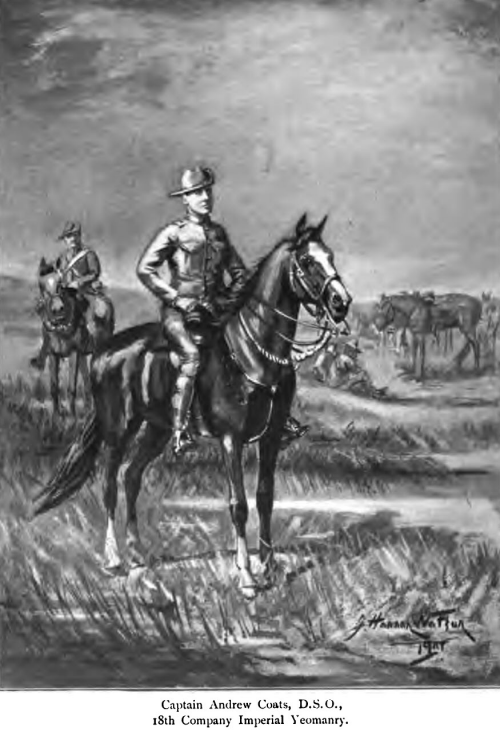|

THE week that followed the dark and anxious Christmas of 1899 saw
arrangements being made to raise and equip 10,000 Yeomanry Volunteers for
service in South Africa, under the name of ' Imperial Yeomanry?' The new
year saw the officers and staff of the different Scottish Yeomanry companies
busily engaged receiving the applications of intending Volunteers, examining
their soundness, their proficiency in riding and shooting, and hurrying
forward the necessary preparations for mobilisation and training.
By Monday, 22nd January, 1900, the four companies forming the Scottish
Battalion were brought together at their respective headquarters to undergo
drill and training till such time as the Government could place a transport
at their disposal. The Queen's Own Glasgow Company—to be known as "The 18th
Company Imperial Yeomanry "mobilised at Maryhill Barracks, Glasgow; the Ayr
and Lanark, or 17th Company, at Ayr; the Lothian and Berwickshire, or 19th
Company, at Edinburgh; and the Fife Light Horse, or 20th Company, at Cupar
in Fife. Colonel C. R. Burn was appointed in charge of the battalion, with
Major Coke second in command.
 Four
and- a half weeks elapsed before we sailed, and the time was spent in
drills—mounted and foot—gymnastics, and learning cavalry methods of managing
horses. The old mansion-house of Ruchill was fitted up for our
accommodation, and, thanks to Colonel Neilson, of the Queen's Own, we fared
well and lacked nothing. Owing to frost, which prevailed the greater part of
the time, we did not get much mounted work; and those whose first experience
on a horse's back had been gained in one or two lessons in a riding-school
were only too pleased to be excused from making an exhibition of themselves
at a jump, or of their capacity to stick on without stirrups. They feared
lest they might get plucked, even at the eleventh hour, should they come too
prominently under the The Regimental Sergeant-Major's notice or the
regimental sergeant-major, our riding instructor. Four
and- a half weeks elapsed before we sailed, and the time was spent in
drills—mounted and foot—gymnastics, and learning cavalry methods of managing
horses. The old mansion-house of Ruchill was fitted up for our
accommodation, and, thanks to Colonel Neilson, of the Queen's Own, we fared
well and lacked nothing. Owing to frost, which prevailed the greater part of
the time, we did not get much mounted work; and those whose first experience
on a horse's back had been gained in one or two lessons in a riding-school
were only too pleased to be excused from making an exhibition of themselves
at a jump, or of their capacity to stick on without stirrups. They feared
lest they might get plucked, even at the eleventh hour, should they come too
prominently under the The Regimental Sergeant-Major's notice or the
regimental sergeant-major, our riding instructor.
It was a time of enthusiasm, excitement, and restless
expectation. Each man could hardly believe his luck in being among the
chosen, and caught his breath at the thought that some condition might still
be imposed which he could not fulfil, or some test be applied which he could
not pass. One or two men had been rejected at a second medical examination,
after having left their situations, done a week's drill at the Barracks, and
received all sorts of presents and farewell banquets. So we could not feel
safe till we were clear away.
I think our many friends must
have appreciated our motives and the sacrifices we were about to make better
than we did ourselves. We were very much carried away by the novelty and
excitement of the moment, and considered we were extremely fortunate to get
the chance of going out to the war under such exceptional circumstances. Too
much, of course, was made of us, but it was all extremely pleasant, unless,
perhaps, the reception in St. Andrew's Hall, where we received at the hands
of the Lord Provost and Councillors the much-prized burgess tickets. There,
so much was said and sung in our praise, that, had we been allowed, we might
have lost our newly-gotten, but still unearned, reputation for bravery by
running away from the place altogether.
On 23rd February—a
Friday—three companies of the Scottish Battalion, with complete outfit and
horses, sailed from the Clyde on board the Allan Line steamship
"Carthaginian." The Fife Company went by Southampton. The enthusiasm of our
send-off at Prince's Dock baffles description. The citizens of Glasgow
turned Out by the thousand, and their numbers were swelled by friends of the
other companies from Lanark, Edinburgh, and Ayr. It was a scene that we can
never forget, and was a final proof that we carried with us the kindly
thoughts and good wishes of those who had already done so much for our
comfort and success by showering upon us everything that could possibly be
of use in our future campaigning.
"Will ye no come back
again?
Better lo'ed ye canna be;
Will ye no come back again?" |

